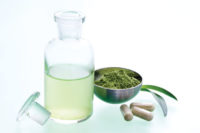Coffee May Lower Prostate Cancer Risk
Men who drink four or more cups of coffee daily are at a lower risk of prostate cancer progression and recurrence.

The study did not, however, find an association between coffee drinking and reduced mortality from prostate cancer, although the research included too few men who died of prostate cancer to address that issue separately. The study also did not find an associated reduction of prostate cancer recurrence and/or progression with tea consumption.
"To our knowledge, our study is the first to investigate the potential association between tea consumption and prostate cancer outcomes," researchers wrote in the study to be published in journal Cancer Causes & Control. "It is important to note, however, that few patients in our cohort were regular tea drinkers and the highest category of tea consumption was one or more cups per day.
"The association should be investigated in future studies that have access to larger populations with higher levels of tea consumption," they said. The population-based study involved 1,001 prostate cancer survivors, aged 35-74 years old at the time of diagnosis between 2002-2005, who were residents of King County, Washington.
Participants answered questions regarding their diet and beverage consumption two years prior to prostate cancer diagnosis. The researchers followed up with patients more than five years after diagnosis to ascertain whether the prostate cancer had recurred and/or progressed. Those who had been diagnosed with non-metastatic cancer were included in the follow-up effort.
Of the original 1,001 patients in the cohort, 630 answered questions regarding coffee intake, fit the follow-up criteria and were included in the final analysis. Further research is required to understand the mechanisms underlying the results of the study, but biological activities associated with consumption of phytochemical compounds found in coffee include anti-inflammatory and antioxidant effects and modulation of glucose metabolism.
The researchers emphasise that coffee or specific coffee components cannot be recommended for secondary prevention of prostate cancer before the preventive effect has been demonstrated in a randomised clinical trial.
Looking for a reprint of this article?
From high-res PDFs to custom plaques, order your copy today!




